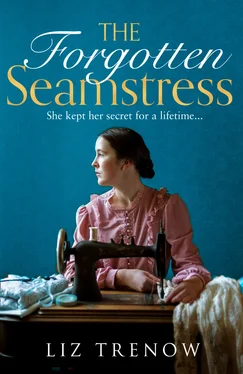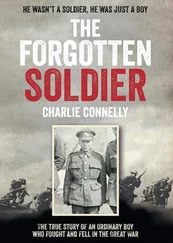1 ...6 7 8 10 11 12 ...15 Nora’s changed each time we played it, but usually involved marrying someone she had read about in the newspapers which got left lying around the servants’ hall, a music-hall star, or perhaps an explorer, like Shackleton or Scott, having six children and living in a large, comfortable house in the country with servants who never gave her any lip like we did.
My happy-ever-after dreams also came from the newspapers: I wanted to be a suffragette like Emmeline Pankhurst, and I would win the respect of women all over the country by persuading the prime minister to allow votes for women and after that, having become famous, I would marry Prince Edward and become queen. Or, perhaps it would be better to become queen first, and then I could change the rules however I liked.
Miss Garthwaite didn’t return the next day nor the next, and we were told she had been taken poorly with her nerves, and might not be back for a few days. The days stretched into a week and then two, and we were working all hours to keep up, but we didn’t complain because we had no one to interfere or bother with us, a kind of freedom we hadn’t never enjoyed before.
That night I had just climbed into bed, weary as a sack of potatoes, when there was a knock on our door and there was Mrs Hardy, the chief housekeeper, with a gentleman in valet’s uniform beside her, whose face I vaguely remembered from the servants’ hall.
‘Miss Romano, Mr Finch needs your help,’ she said. ‘Get dressed at once, smart as you can. We’ll wait here for you.’
If she hadn’t such a serious face on I’d have thought it was a joke but since it wasn’t I nearly fainted out of sheer terror. I shut the door and started trying to get dressed, and Nora didn’t help by teasing me about going for a midnight rendezvous with my lover.
When I was ready Mrs H said, ‘You’re to get your sewing kit, then go with Mr Finch, and do exactly as he tells you. Remember to curtsey when you are introduced. You must not speak unless you are spoken to, nor look him directly in the eye, and you must do whatever you are told without saying anything at all, except if you have to ask Mr Finch something.’ I nodded to show I’d understood, but I hadn’t a clue who we was going to see – surely not the king himself? – and my heart was pounding so hard I was sure I’d not remember a thing.
Mr Finch strode off with me trotting to keep up, down the stairs of the servants’ wing to the sewing room to collect what Miss G calls her ‘basket of necessaries’, then we was off again, up the stairs to the door which leads into the palace proper, and along those deep carpeted corridors and up more stairs, great wide ones with shiny brass handrails and massive paintings all over the walls, and then along another corridor with so many doors I lost count of them. No one else seemed to be around, no footmen or other servants, nor any other members of the family.
All the while Mr Finch was talking to me. ‘Urgent alterations are required, Miss Romano, to an item of clothing for his investiture,’ he said, and I tried to recall where I’d heard the word before, to give me a clue about where we was headed. Mr Finch was rabbiting on. ‘The costume has been made for him by the royal costumiers but His Royal Highness is not happy with it. I have made a number of adjustments but I have been unable to please him. Specifically, the breeches are too wide and he would like them taken in. The fabric is so fine that it puckers with every stitch, so I hope that your small hands will be more successful than my own efforts. Are you listening, Miss Romano?’
As it slowly dawned on me who we was heading for, I felt sure I would faint clear away before I got there.
‘Yes sir,’ I puffed, ‘I will do my best to please the prince.’
‘Not “the prince”,’ he snapped in a fearsome whisper. ‘“His Royal Highness” it should be, at all times, and you are not to address him directly, ever.’
‘Understood, Mr Finch,’ I said, praying I would remember all the instructions flying my way.
‘We are going to his private chambers, and afterwards you are not to breathe a word to anyone about where we have been, is that understood?’
‘Yes sir,’ I managed to gasp again, just as we arrived. Mr Finch smoothed down his hair and pulled his jacket straight, and I checked that my dress and apron were in order, and my hair still neatly tied back. Then he opened the door.
The tape comes to an end.
Patsy Morton research diary, 2nd June 1970
Meeting with Dr Watts at lunchtime today, as Prof insists, to get the benefit of his ‘guidance’ about my potential ex-patient interviewees. In other words, he wants to make sure I’m only talking to people who will tell it as he wants it told.
To be honest I didn’t take to the man at all. He talked down to me as if I was a child, calling me ‘dear’. I’m not his ‘dear’. We’ve only just met. Perhaps that’s how he treats all women, but by the end I felt like slapping him.
He didn’t seem to have any objections to the other three patients on the list but when it came to Maria Romano he’s definitely warning me off. He started with the usual caution about patient confidentiality and then proceeded to break all his own rules, telling me that she’d been a patient for many years suffering from what he called persistent paranoid delusional mania, and even reading direct from her file, like he really had a point to prove. Of course I didn’t tell him I’ve already started interviewing her!
His secretary came and whispered something in his ear and he asked me to excuse him for a few minutes. He was gone for much longer so I started wandering around his office, looking through the windows, etc., till I noticed he’d left M’s file open on the desk.
I had a quick flick through but it was all a bit technical and there was not enough time to make proper notes. Then remembered I’d brought my camera so took photos of a couple of pages then got jumpy. Dr W came back after about quarter of an hour, all bright and breezy, we chatted a bit more and I said goodbye.
New problem: how to get my photographs of the medical notes developed without revealing personal information? Can’t take them to Boots the Chemist, can I?
London, 2008
That very week, despite my impeccable answers to those consultants’ crass questions, I was made redundant. ‘Pack-up-your-desk-within-the-hour’ redundant. And although I knew that the immediate dismissal was nothing to do with their assessment of my honesty and everything to do with protecting commercial secrets, it felt as though I’d been kicked in the teeth and all my hard work for them over the past few years was entirely wasted.
‘I just don’t know who I am any more,’ I moaned, pouring myself a third glass of Pinot, when Jo arrived that evening. ‘It sounds so stupid. It was a hellish, boring job and I couldn’t wait to get out. But being made redundant makes you feel as though they haven’t valued a single thing that you’ve done for them, in four years. I walked out of there feeling like a non-person.’
Jo and I have been best friends since fashion college. We’d shared several grubby bedsits in the early years and were virtually inseparable until relationships and careers took us on different paths. I still have a photograph of us on graduation day, snapped by my proud mum. Jo is squinting at the camera in an attempt to please, and I am gazing into the distance, perhaps daydreaming or simply bored by the whole event. Neither of us would wear a traditional gown and mortar board for the occasion, of course, being far too cool for that sort of thing. We opted instead for some of our more outlandish fashion statement outfits, all torn edges and spray painted patterns – we’d dubbed it graffiti chic, as I recall. I cringe whenever I look at it. She is tall and angular, with an unkempt mop of hair blowing into her eyes; I’m a head shorter, slightly built, my round face topped with a rebellious retro-punk hairstyle like a blonde pincushion. It was not a flattering look and soon got discarded once I started job hunting and saw the disdainful glances of the slick-suited bosses I was trying to impress.
Читать дальше












